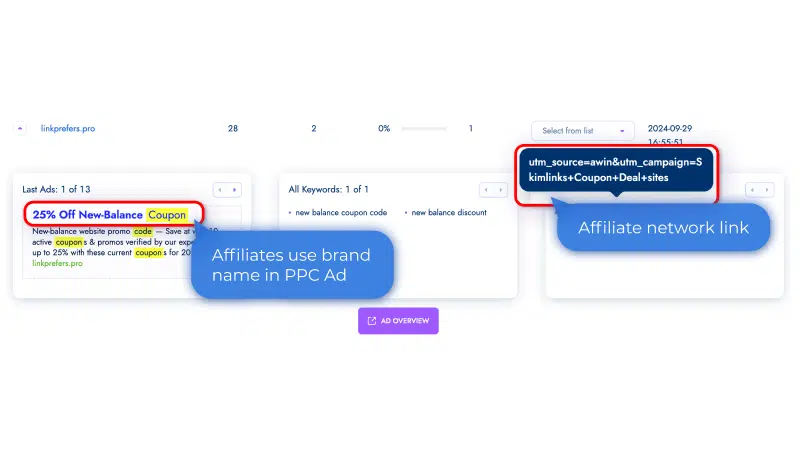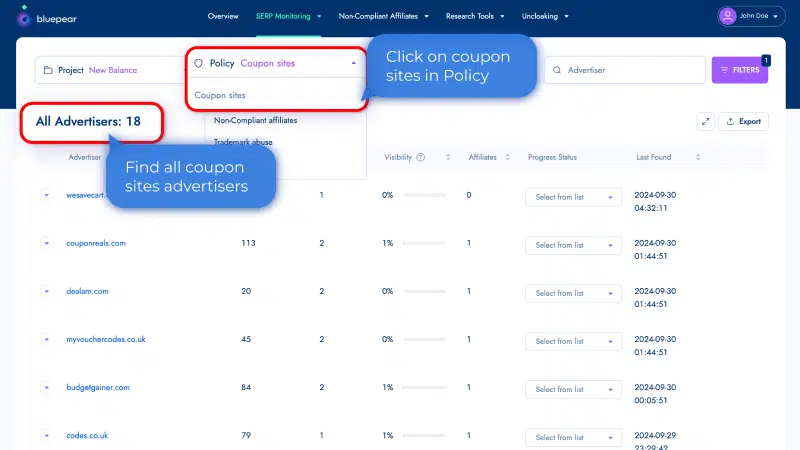Opinions expressed in this article are those of the sponsor. Search Engine Land neither confirms nor disputes any of the conclusions presented below.
Coupon sites: The hidden threat to your brand
Explore the risks of coupon sites for brands and discover how to mitigate these challenges effectively.

Many marketers consider coupon sites allies in driving sales and enhancing brand visibility. However, a deeper examination reveals that these platforms can significantly undermine your marketing budget and brand integrity.
This article delves into the risks associated with coupon sites and illustrates how Bluepear can help brands navigate these challenges.
The problem with coupon sites
At first glance, coupon sites appear beneficial for promotion. They offer discounts that attract loyal customers, making it seem easy to boost sales.
However, the reality is more complex:
1. Coupon shoppers: Bottom of the funnel
Coupon sites primarily attract people who are already inclined to make a purchase.
A potential buyer visits your website, notices a field for a promo code, and then heads to a coupon site for discounts. They return to your site, but now with a mindset focused on paying less.
Essentially, you are paying commissions on traffic you already generated.
2. Lower average order value
While coupon sites may close some sales, they often lead to reduced revenue. Discounts lower the average order value, which can be especially detrimental for premium brands.
Instead of increasing income, you end up sacrificing margins on customers who were already interested in your products.
3. Reputational risks
Many coupon sites publish outdated or even fake promo codes.
Imagine a customer’s disappointment when a code fails to work. Such experiences erode trust in your brand and drive customers toward competitors offering more reliable discounts.
Common mistakes when engaging with coupon sites
While coupon sites can have some advantages, failing to manage their influence can severely harm your brand. Here are several common pitfalls brands encounter:
- Bidding on branded keywords with “coupon”: Affiliates often bid on keywords that include your brand name alongside terms like “coupon” or “discount.” This practice quickly consumes your advertising budget without attracting new customers. These users are already familiar with your brand and are seeking savings, leading to overspending and declining margins.
- Reducing margins on low-margin products: Offering universal coupons (e.g., 20% off sitewide) can harm sales of low-margin items. If a product has only a 20% markup, the brand incurs losses while paying affiliates commissions.
- Posting fake coupons or “click to reveal” offers: Numerous coupon sites feature buttons labeled “click to get a coupon,” even when no discount is available. This misleading promotion confuses customers, frustrates them, and damages your brand’s reputation.
- Neglecting noindex tags on coupon pages: Applying a noindex tag to coupon pages is crucial for maintaining keyword rankings. If these pages are indexed, it can negatively impact your site’s visibility, resulting in double costs: first for attracting the customer and then for providing a discount through the coupon site.
- Failing to measure original sales vs. coupon sales: It’s essential to track the number of sales coupon sites genuinely generate versus the number of users who leave your site in search of discounts.
How Bluepear identifies and mitigates risks from coupon sites
Bluepear addresses this challenge by implementing an advanced filtering system that monitors affiliates using promo codes. This allows brands to detect and block unauthorized coupon codes and identify affiliates who employ these promotion tactics.
The Bluepear system delivers comprehensive reports to brands, providing evidence of violations that include:
- Screenshots of ads featuring promo codes.
- Screenshots of websites.
- Links directing to coupon sites.
This approach halts unauthorized promotions and safeguards the business’s profit margins.

Example of working with the New Balance brand
Let’s take New Balance as a case study. The brand faces the issue of unauthorized coupon usage. Their affiliate program explicitly prohibits the use of paid advertising on branded keywords and the promotion of promo codes, except in approved instances.
By accessing the Bluepear system and applying the Coupon Sites filter, we quickly identified 18 violations from affiliates employing prohibited promotional methods.

We observe the use of branded keywords and coupons, which we immediately log as violations of the program’s terms.
Protect your brand – and your budget
Working with coupon sites may seem like a convenient way to expand reach. However, without continuous monitoring, it can lead to financial losses and reputational damage.
The Bluepear system enables brands to oversee these processes effectively and mitigate any risks associated with coupon affiliates.
Related stories
New on Search Engine Land
